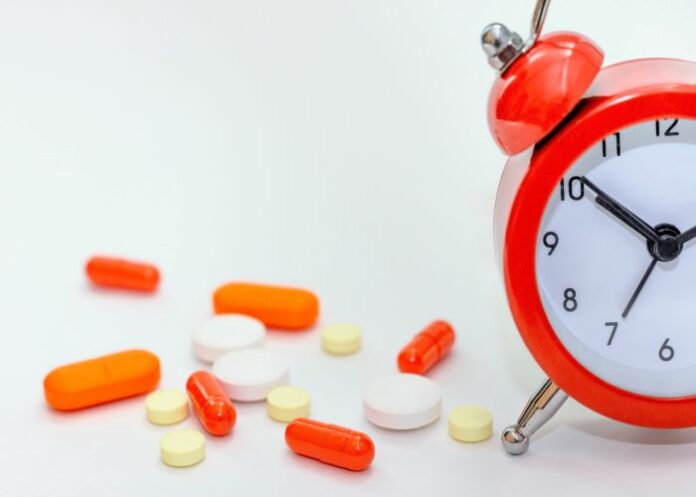It doesn’t matter what time of day or night you take your blood pressure medication, a recent TIME study has found, contradicting previous research that suggests more benefit when the meds are taken at night.
The results of a randomised trial of more than 21 000 patients with high blood pressure who were followed for more than five years, show that protection against heart attack, stroke and vascular death is not affected if the drugs are taken in the morning or evening, reports HealthDay.
For the study, men and women were randomly assigned to take their blood pressure drugs in the morning or evening. The researchers then looked for hospitalisation for heart attack, stroke, or death from cardiovascular disease.
Over a median of five years, 3.4% of those who took their medication at night and 3.7% of those who took their medication in the morning were hospitalised for heart attack, stroke or died from cardiovascular disease.
Those told to take their usual blood pressure (BP) therapies in the morning (6am to 10am) or evening (8pm to midnight) had comparable rates of myocardial infarction (MI), stroke, or vascular death over the next five years (HR 0.95, 95% CI 0.83-1.10), said Dr Thomas MacDonald of the University of Dundee in Scotland on Friday during the European Society of Cardiology (ESC) Congress in Barcelona.
Notably, the 13% of participants who had diabetes also had similar results with morning or evening dosing, reports Medpage Today.
Research presented at medical meetings is considered preliminary until published in a peer-reviewed journal.
The study “was one of the largest cardiovascular studies ever conducted and provides a definitive answer on the question of whether blood pressure-lowering medications should be taken in the morning or evening”, said MacDonald.
“The trial clearly found that heart attack, stroke and vascular death occurred to a similar degree, regardless of the time of administration,” he said. “People with high blood pressure should take their regular anti-hypertensive medications at a time of day that is convenient for them and minimises any undesirable effects.”
The evidence for night-time anti-hypertensives has been controversial. In 2010, the MAPEC study found that bedtime anti-hypertensive dosing improved BP control and reduced cardiovascular morbidity and mortality. A subsequent study, the Hygia Chronotherapy trial, favoured this approach as well, but has had its conduct questioned by sceptics.
“Why is TIME neutral? I think that’s the big mystery,” MacDonald said.
Circadian variability of BP usually results in a dipping of BP at night. In theory, evening dosing would help people, given that ambulatory monitoring suggests higher night-time pressure is a good predictor of bad outcomes.
On the other hand, night-time anti-hypertensives are associated with morning hypotension, which can predispose people to increased risk, noted ESC session discussant Rhian Touyz, MBBCh, PhD, of McGill University in Montreal.
For her, the question of the chronobiology of BP drugs may not be totally settled for every person. She said the present study did not fully consider special groups, such as those with nocturnal hypertension.
MacDonald added that it’s possible that certain groups, like people with resistant hypertension and obstructive sleep apnea, could still be shown to benefit from evening BP medication dosing in a large enough study.
He highlighted the observation that patients experienced daily fluctuations in systolic blood pressure on home monitoring, suggesting that their once-daily medications were not providing adequate coverage throughout the day.
“The push should be we should have tablets that really work 24 hours,” he said.
The TIME trial employed a decentralised design that enrolled and randomised patients through an online portal. Eligible participants were patients of the UK NHS with high BP.
MacDonald noted that TIME’s original sample size had been doubled due to concerns about low cardiovascular event rates.
Ultimately, there were 21 104 participants split between morning and evening medication groups. Mean age was 65 years, and 57.5% of the group were men. Baseline BP was 135/79 mm Hg – quite well controlled from the start, Touyz noted. Patient characteristics were well balanced between groups at study entry.
As for safety, MacDonald reported no excesses in falls and fractures associated with taking anti-hypertensives in either the morning or evening.
The lack of a standardised treatment protocol was a limitation of TIME, Touyz cautioned. She added that adherence may also be an issue in the study, as patients reporting non-adherence to their dosing schedule at any time during the study reached 22.5% vs 39.0% (P<0.0001).
Adherence in TIME wasn't so bad considering the long duration of the study, MacDonald argued. “I am absolutely confident that we did our study … as best as we could,” he said, citing his team's adjudication of events and the intention-to-treat analysis.
HealthDay article – Is there a best time of day to take your blood pressure pill? (Open access)
MedPage Today article – Breakfast or Bedtime BP Meds? Timing Doesn’t Matter After All (Open access)
See more from MedicalBrief archives:
Bedtime BP meds may cut heart risk by almost half – large randomised study
21-year study finds evidence for evening hypertensives in diabetics

